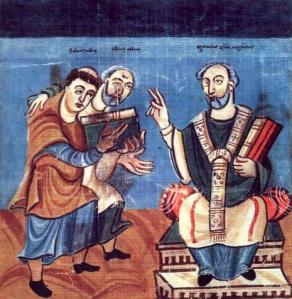 God calls the Israelites an upright people, a race without reproach, descended from the seed of the patriarchs and ever a worshipper of the one true God, whether oppressed by the Egyptians and other nations, or freed from them by the leadership of Moses and Aaron.
God calls the Israelites an upright people, a race without reproach, descended from the seed of the patriarchs and ever a worshipper of the one true God, whether oppressed by the Egyptians and other nations, or freed from them by the leadership of Moses and Aaron.
They were raised aloft by the wonders of God, at the crossing of the Red Sea, a cloud covering them by day and a pillar of fire shining over them by night; and God worked other miracles abundantly for them in the desert besides.
The Lord mysteriously frees his chosen ones from the hands of their persecutors, terrifying their enemies by a blinding flash of miracles.
He gives his servants wisdom of a kind not to be resisted or gainsaid by any adversary.
Wherefore they stand fearless in the presence of the kings and potentates of this world, speaking the word of God with confidence.
And, through the sufferings of martyrs, they attain to the rewards of the kingdom of heaven, where they sing praises forever to their king and saviour.
His wisdom has opened the mouths of the dumb and made eloquent tongues of babes.
Clear it is that, apart from God’s gift of wisdom, the mind of man cannot think anything out aright, or speak to any great purpose.
Wherefore from him alone is sound understanding to be sought, or the faculty of talking good sense; for from him, through him, and in him are all things.
He entrusted their concerns to the hands of his holy Prophet Moses. They made their journey through the desert places where no man dwelt; and in the secret places did they find their lodging.
The ancient people set out from Egypt led by Moses and went through the desert, pitching their tents in uninhabitable places, as the Pentateuch relates.
So also nowadays the people follow – the Christians follow, that is to say – the lead of the prophecy, to make their way in the desert of this world, whereby they are to reach their homeland, in the heavenly kingdom, where Christ reigns.
This is what Saint Peter the Apostle revealed, when he said: We have a surer prophetic utterance which you would do well to heed, as it were a lantern lit in a dark place till the day shall dawn and the morning star rise in your hearts.
Rabanus Maurus (c.780-856): Commentary on Wisdom, 2, 7 (PL 109:718-719); from the Monastic Office of Vigils, Tuesday of Week 31 in Ordinary Time, Year 2








